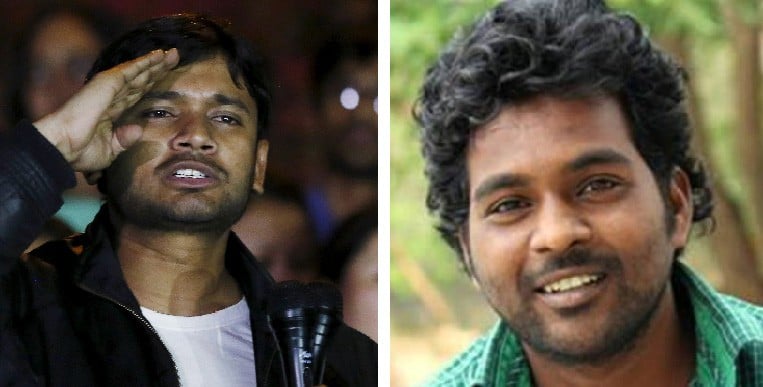
The focus on Kanhaiya Kumar and the anti-national debate conveniently supplements the superstructures of a class-based, caste-based society when, in fact, Rohith Vemula’s suicide is the base on which Kumar’s superstructure stands

My mentor, Prof Tahir Kamran’s recent article ‘Azadi in a national frame’ , published in the TNS issue of 13 March, claims to be an attempt at understanding what he calls the ‘Kanhaiya Kumar phenomenon’. While he succinctly describes and celebrates Kumar’s rise as the Indian polity’s struggle to unite in the face of an agenda of redefining Indian nationalism, through a rather myopic vision of Hindutva agenda, his take on the issue does not place Kumar in the larger ‘phenomenon’ of a superstructure that obfuscates the real issue of Rohith Vemula’s suicide.
Kumar is privileged in more ways than one, as pointed by Prof Kamran. He does not come from a socially and financially privileged background, but in being a part of a truly secular and Leftist institution, like the Jawaharlal Nehru University. He is positioned at an intellectually superior and more vibrant class-based society, where wealth inequality is far more pronounced than in most other nations. It also helps that he is the students’ union leader of India’s premier arts and social sciences university, where revolutionary thought is not an anomaly but rather is considered an everyday staple.
YouTube and Facebook, in particular, have been abuzz with the hashtag ‘StandWithJNU’. In a typically tit-for-tat manner, JNU academics have delivered a series of lectures on nation and nationalism to audiences of thousands on the campus as a reaction to the vice-chancellor’s instruction to not discuss the issue publicly. Political scientist Gopal Guru, linguist Ayesha Kidwai, and historians Romila Thapar and Harbans Mukhia are some of the speakers who have delivered these short talks in the open-air theatre at JNU. Noam Chomsky has expressed solidarity with JNU. Kumar has been presented as a hero.
Prof Kamran’s article, to which I allude at the beginning, posits that in Kumar, India has found an opposition leader to counter Modi.
While one does feel electrified by the intellectual climate generated by the row, and the fierce academic debate that has followed it, one must not forget that the issue that sparked Kumar’s protest and the subsequent chain of events is not the death sentence of Afzal Guru, but the suicide of Vemula, a Dalit scholar from the Hyderabad Central University, who was driven to this extreme measure after his PhD stipend was not awarded for a few months in what critics of the Indian caste system believe was a discriminatory move.
For a country that boasts a large number of dollar-billionaires, India remains a largely poor country. Its identity as a secular nation is questionable given the plight of minorities and the entrenched caste system. In such a diverse and divided society, minorities like the Dalits do not have any access to means of production, and can never hope to climb the ladder of social hierarchy. The only way that the Indian public, particularly the Dalits, manage to gain some semblance of social mobility is through the education system that, in all fairness, provides a very significant part of the populace a chance to lead a better life.
Enter the University Grants Commission (UGC). The UGC has had a long history of intervention in the affairs of universities, being the regulatory organ of the state, doling out fellowships and grants. More significantly, it has the power to stop grants from being awarded. A development ignored by Pakistani media last year was the ‘Occupy UGC’ protest movement, which emulated the structure of ‘Occupy Wall Street’ to highlight the UGC’s discriminatory policies and lack of transparency. Vemula was a supporter of Occupy UGC. Vemula worked for the Ambedkar Students Association, named after Dalit leader Ambedkar.
The great irony of Indian nationalist politics is that even the BJP’s Hindutva and caste agenda is made possible within the framework of India’s secular constitution, drafted principally by Ambedkar. The greater irony is that payment of Rs25,000 per month to Vemula, a supporter of Occupy UGC and a worker of ASA, was stopped in July 2015. This made it impossible for him to pursue his studies, and frustrated with the political and social ostracising of Dalit students on campuses, this led to his eventual suicide on January 17, 2016.
Vemula’s life story is far more reflective of Indian society than even Kumar’s. Vemula’s mother was sold to a woman from a higher caste, who offered her in child-marriage to a man from her own caste, and hid the fact that the girl was a Dalit. When Vemula’s father eventually found out the truth, this unleashed a torrent of domestic violence that resulted in the mother and her children returning to the adoptive grandmother’s house. Here, as reported by Vemula’s best friend, they lived like servants. Vemula supported his higher education through odd jobs, and his PhD depended on the grant which was later stopped over ‘procedural delays’.
Vemula’s suicide exposes the bitter reality of a polarised polity. Given recent developments in Indian politics, it is not surprising that the UGC is perceived as targeting the underprivileged segments of society and denying them the little share of social mobility that they have managed to acquire through India’s largely secular education system.
While the focus on JNU and on Kumar’s potential role as a leader of opposition to Modi and BJP is justified and gives one much hope, let us not forget that JNU students are far better placed to survive in Indian society than Vemula ever was. Kumar is lucky to have some of the world’s foremost scholars standing with his cause. Vemula did not get such support in his lifetime. ‘#StandWithJNU’ has already appropriated attention from ‘#JusticeForVemula’. The focus on Kanhaiya Kumar and the anti-national debate conveniently supplements the superstructures of a class-based, caste-based society.
Rohith Vemula’s suicide is the base on which Kumar’s superstructure stands. Kumar is a symbol. Vemula was the essence.